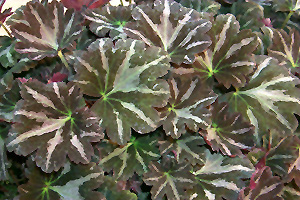Silver Velvet Saxifrage
Saxifraga fortunei 'Silver Velvet'
Plant Height: 6 inches
Flower Height: 9 inches
Spacing: 5 inches
Sunlight:
![]()
![]()
Hardiness Zone: 5b
Other Names: Japanese Rockfoil
Ornamental Features
Silver Velvet Saxifrage features tiny spikes of white star-shaped flowers rising above the foliage from late summer to mid fall. Its attractive small needle-like leaves remain coppery-bronze in color with prominent silver stripes and tinges of light green throughout the season.
Landscape Attributes
Silver Velvet Saxifrage is an herbaceous perennial with a mounded form. Its relatively fine texture sets it apart from other garden plants with less refined foliage.
This plant will require occasional maintenance and upkeep, and should not require much pruning, except when necessary, such as to remove dieback. It has no significant negative characteristics.
Silver Velvet Saxifrage is recommended for the following landscape applications;
- Rock/Alpine Gardens
Planting & Growing
Silver Velvet Saxifrage will grow to be only 6 inches tall at maturity extending to 9 inches tall with the flowers, with a spread of 6 inches. When grown in masses or used as a bedding plant, individual plants should be spaced approximately 5 inches apart. Its foliage tends to remain low and dense right to the ground. It grows at a slow rate, and under ideal conditions can be expected to live for approximately 5 years. As an herbaceous perennial, this plant will usually die back to the crown each winter, and will regrow from the base each spring. Be careful not to disturb the crown in late winter when it may not be readily seen!
This plant does best in partial shade to shade. It requires an evenly moist well-drained soil for optimal growth, but will die in standing water. It is not particular as to soil pH, but grows best in sandy soils. It is somewhat tolerant of urban pollution, and will benefit from being planted in a relatively sheltered location. Consider applying a thick mulch around the root zone over the growing season to conserve soil moisture. This is a selected variety of a species not originally from North America. It can be propagated by division; however, as a cultivated variety, be aware that it may be subject to certain restrictions or prohibitions on propagation.

